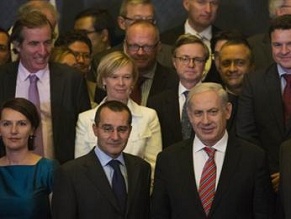|
World Jewish News

Israeli ¨Prime Minister Benjamin Netanyahu at a meeting with ambassadors of EU countries
|
Israel PM welcomes fresh EU sanctions on Iran
17.10.2012, Israel and the World Israeli Prime Minister Benjamin Netanyahu praised the European Union on Tuesday for the latest round of sanctions imposed on Iran, but reserved judgment on whether it would halt its nuclear drive.
EU Foreign Ministers agreed Monday to further sanctions against major Iranian state companies in the oil and gas industry, and strengthened restrictions on Iran’s central bank.
"I want to commend the European Union for the tough sanctions that were adopted yesterday against the greatest threat to peace in our time," he told EU diplomats in Jerusalem, in remarks communicated by his office.
"These are serious sanctions against Iran," he said.
"These sanctions are hitting the Iranian economy hard," he added. "We'll know they are achieving their goal when the centrifuges stop spinning and when the Iranian nuclear program is rolled back."
"I believe that all those who seek to ensure world peace and security share this aim, not only in the Middle East but throughout the world. These are momentous issues and momentous times," Netanyahu said.
Andrew Standley, the EU ambassador to Israel, said in public remarks at the meeting with Netanyahu that "Iran's nuclear program is a concern not only to Israel but also to the region and the wider international community".
Israel and much of the West believe that Iran is using its nuclear programme to develop an atomic weapons capability.
Israel has refused to rule out a military strike to prevent that from happening.
Netanyahu also addressed the situation in Syria, and told the envoys the transfer of Damascus' chemical weapons to Hezbollah or other militias would force Israel to consider military action.
An Israeli official who attended the meeting cited Netanyahu as saying that, "at the moment, the (chemical) weapons are under the state's control. But if that changes we might have to act."
"He said Israel could not allow these chemical weapons to fall in the hands of extremists such as Hezbollah or Al-Qaeda, or other such groups, and that Israel reserved the right to act in such a situation," the official told AFP.
In July, Netanyahu and other senior Israeli officials raised the possibility of military action to prevent Syrian chemical weapons from falling into the hands of the militia of the Lebanese Shiite party Hezbollah.
On a separate front, Netanyahu also said "the Egyptian-Israeli peace agreement must be maintained," the official told AFP.
"Israel is committed to maintaining the agreement. We hope the other side is also committed," the official cited Netanyahu as telling the diplomats.
"He said keeping the agreement is also of importance since it shows that signed agreements are kept, and that's good for peace in the future," said the official.
Egypt was the first Arab country to sign a peace treaty with Israel, in 1979.
The Israeli premier also congratulated the EU on receiving the Nobel Peace Prize.
"Would that we could replicate in the Middle East what was achieved in Europe," Netanyahu said. "That is, decades of stability and peace and tranquility."
EJP
|
|
